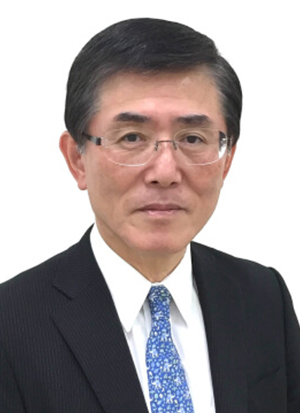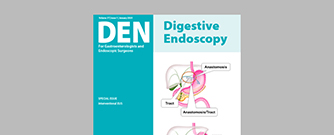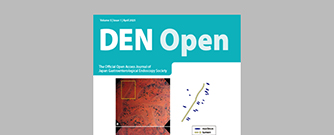President’s Remarks
Inauguration of President of the Japan Gastroenterological Endoscopy Society
President Shinji Tanaka
Japan Gastroenterological Endoscopy Society

I would like to extend my greetings and appreciation to you for my appointment as the 7th President of the Japan Gastroenterological Endoscopy Society (JGES) at the 103rd Congress of JGES (Kyoto) held from May 13th to 15th, 2022.
Following a preparation period of several years, the JGES was established as the Japan Gastrocamera Society in 1959. I was born in 1958, so this fact stirs many emotions in me. This society is now a huge society with about 35,000 members (as of May 2022). Under the strong leadership of successive Presidents, Sadataka Tasaka, Takao Sakita, Hirohumi Niwa, Michio Kaminishi, Hisao Tajiri, and Haruhiro Inoue, a brilliant history has been built and many world-renowned achievements have been made.
Due to the COVID-19 pandemic, it has become difficult to hold general meetings and other events normally, and the enhancement and spread of online programs has changed the way academic societies and seminars function. Fortunately, under the leadership of President Haruhiro Inoue, and thanks to the efforts of all the officers, we have been able to continue the operation of the JGES without sacrificing activity. First, I think it is my duty to properly continue such activities and further develop the JGES toward the present-day and post-COVID-19 era.
We will continue to aim for further advances and development of the JGES and endoscopic medicine with the continued support and cooperation of our members. Thank you for your cooperation.
1. Medical specialist system
In the new medical specialist system, the JGES has already been certified as a sub-specialty organization thanks to the efforts of all concerned, including former President Hisao Tajiri, former President Haruhiro Inoue, Director Kiyohito Tanaka, and Director Mitsuhiro Fujishiro. Even now, discussions with the medical specialist organization are ongoing. This society is cross-sectional and spans multiple academic societies with six basic academic societies (Japanese Society of Internal Medicine, Japan Surgical Society, Japanese Association for Acute Medicine, Japan Pediatric Society, Japan Radiological Society, and Japanese Society of Laboratory Medicine). In the new medical specialist system, there are many issues that are still under deliberation, but in the future, we will work closely with the organization headquarters and related academic societies, and the Board of Directors will make the utmost efforts to achieve the best results for all the members of the Society.
In addition, thanks to the efforts of former director Mototsugu Kato and Committee Chair Takahisa Matsuda, we have started our own screening certification medical system. Even those who do not meet the requirements of a medical organization specialist can advocate their specialty through this qualification, and the training system is well-developed, so we hope that you can make effective use of it.
2. JED (Japan Endoscopy Database) project
This is a revolutionary world first project to register all cases of endoscopic diagnosis and treatment. Thanks to the efforts of Director Haruriko Ogata and Director Kiyohito Tanaka, it has become widespread and popular. JED is closely linked to the medical specialist system, and high-quality endoscopic medical care in Japan is automatically registered as national data, so it can make a great contribution to many research presentations and understanding of the status of endoscopic medical care nationwide. JED has already become an independent corporation, and further development is expected in the future.
3. Reform and enhancement of the education/training system
With the introduction of the new medical specialist system, the requirements for acquiring and renewing specialist certification will change. In response to this, among other measures, we aim to further enhance academic society seminars, branch seminars, priority postgraduate education seminars and live seminars/hands-on seminars co-sponsored by the JGES. As a major policy in the future, lecture seminars will be mainly held online, while general meetings and branch meetings will generally be held face-to-face. Participating in the conference venues, face-to-face Q&A, and interacting with doctors at other facilities are indispensable for exchanging information, maintaining and improving motivation, and training young doctors.
4. Career support for female endoscopists
As the number of female doctors increases, the number of doctors who are struggling to balance childcare with medical care/research is also increasing. It is an issue for Japanese society as a whole, but it is also an extremely important issue for our JGES. Regarding support for female endoscopists’ careers and career advancement, Director Akiko Shiotani will focus on creating an environment where they can play an active role.
5. Continuation and further development of internationalization ebents
The joint symposium with the European Society of Gastrointestinal Endoscopy (ESGE) and that with the American Society for Gastrointestinal Endoscopy (ASGE) have become fully established as exchanges with overseas academic societies. Director Hironori Yamamoto will make every effort to make the program more fulfilling than ever. There is also the JGES STARS Program, which invites young Asian doctors to Japan. It is currently suspended due to COVID-19, but we hope to gradually resume it in the future. For Japan to be evaluated as a leader in Asia, I would also like to continue to accept many young international students who have the potential to lead endoscopic medicine in Asian countries.
Currently, we have set up a review committee with the aim of establishing a new international event (JGES International) unique to the JGES, and we are taking the time to continue careful deliberations while listening to the opinions of the councilors.
6. Enrichment of English sessions
In Asia, Taiwan (DEST), South Korea (IDEN), Hong Kong (IDDF), Singapore, and others hold regular annual international conferences with English as the official language. Young doctors from other Asian countries are also actively presenting and discussing at academic conferences in Europe and the United States. Nowadays, internationalization and exchanges are progressing worldwide, and the Congress of JGES also needs to respond to internationalization. Setting up English sessions and translating slides into English will be extremely useful for overseas doctors attending the Society Congress, and I think it will also be a place for young endoscopists in Japan to study discussions in English. Of course, it is extremely important for the Congress of the Society to be a place for practitioners and doctors who are not involved in international activities to study, so it is indispensable to continue to enhance Japanese sessions. I believe that it is essential to balance these two aspects at the Congress of the JGES.
7. Further enhancement of academic journals: DEN, DEN Open (English journal)/ Gastroenterological Endoscopy (Japanese journal)
The impact factor (IF) of Digestive Endoscopy (DEN), an English journal, increased to 7.559 in 2020 thanks to the extraordinary efforts of the editorial committee members led by Director Takayuki Matsumoto. We hope that it will be further developed and become an international journal that will overtake GIE and Endoscopy. Furthermore, with the efforts of Director Masayuki Matsumoto, Committee Chair Takao Itoi, and editorial committee members, DEN Open, which is a sister journal of DEN published recently, was already listed in the PMC on March 22, 2022 and can be searched on PubMed. All papers from the time of the first issue will be available, and the most recently published papers will be listed in order.
On the other hand, the Japanese journal is also coming very much into its own, with strict deliberation by the editorial board every month under the guidance of former Director Naotaka Fujita, Director Kazuo Inui, and Committee Chair Shiro Oka. It is very useful for daily medical care, so we hope that you will read it every month.
8. Development of guidelines
The Guidelines Committee is led by Director Yoshinori Igarashi and Director Mitsuhiro Fujishiro, and the JGES has published many substantial guidelines. We would like to update these one by one according to the Sunset rule (the idea that guidelines that have not been revised for more than 5 years are out of date) and provide the latest information.
9. Ethical issues
Due to recent changes in social conditions, ethical conditions such as Conflict of Interest for research and conference presentations are becoming stricter. Director Kazuo Inui and Committee Chair Masao Kobayakawa are working hard to provide the latest information to the Society members, but please be aware that the members should also refer to the academic society website and keep up with social trends.
10. Industry-academia-government joint venture from a global perspective
Thanks to the efforts of our predecessors, the endoscope business is dominated by major Japanese manufacturers alone, accounting for almost 100% of the world market share. This situation is unique. To make the best use of this advantage, industry, academia, and government must work closely together to ensure bold and effective global dissemination. Endoscopic medicine is a field that is directly linked to human health promotion and welfare in all aspects of diagnosis, treatment, and elucidation of pathogenesis. In the future, with the rapid progress of computerization, AI, and IT, there are great expectations for industry-academia-government collaboration throughout the country. At the JGES, the AI Promotion Review Committee led by Director Haruhiko Ogata and Committee Chair Yutaka Saito will continue to work on these collaborations.
Although I have highlighted various topics, I would like to apologize for not being able to explain all the specific efforts of the JGES due to space limitations.
Finally, as a society where young doctors who love endoscopies find delight and fulfil their dreams, we hope that the JGES will develop further both medically and socially. As President, I am determined to do my best to build an operating system that allows all officers to work together and to ensure a smooth change of generations. We appreciate your support and the cooperation of all our members.
May 18, 2022




